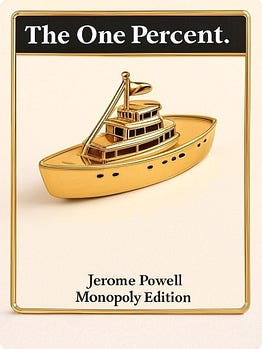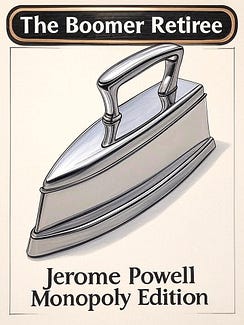You are a free subscriber to Me and the Money Printer. To upgrade to paid and receive the daily Capital Wave Report - which features our Red-Green market signals, subscribe here. Welcome to Monopoly: The 2025 Jerome Powell EditionImagine if we turned the classic Parker Brothers Game into something that resembled 21st century economic conditions... Would you still call this capitalism?Dear Fellow Traveler: In 2022, I wrote a warning in LuckBox Magazine…
The title: Modern Monetary Monopoly. It wasn’t a left or right article. It was an up-and-down one. We have turned our entire economy into a board game… one built on extraction. While everyone was drunk on stimulus checks and meme stocks, I wrote about what happens when you fuse Monopoly with Modern Monetary Theory. Three years later, and we're seeing the monster overwhelm everything… Now, Parker Brothers called… and they want their game back before we destroy it. I propose we return it and recreate the game to current standards… Call it The Federal Reserve Chairman “Jerome Powell Special Edition.” This version of Monopoly isn’t the same as the one your grandfather played… But, ironically, he’s one of the few people who can afford to play the game anymore… In the Jerome Powell edition, the rules change every time someone important looks uncomfortable, the money printer never stops, and the bank is run by an 8-year-old named Timbo, whose father owns the Park Place property. Timbo insists he's "independent" while wearing a Goldman Sachs shirt with a Batman cape. He can't pronounce "quantitative easing," but he knows how to print money when dad's properties are in trouble. Now… before we begin… a few important details… The board has been "adjusted for inflation…" Everything costs more and more each time (one year) around the board… But the GO square still and ALWAYS pays $200 because we’re told that wage growth will cause inflation (not… all damn money printing that will occur in this game.) Also… players must stand and pull up their bootstraps every time they pass GO... (Disclaimer: Bootstraps sold separately.) Many other things are different about the Jerome Powell Edition of Monopoly… For example, the hotels have all been acquired by private equity firms before the game starts and converted into REITs for greater tax efficiency. The dice are also loaded, but only Players 1 and 2 know which numbers come up more often. Speaking of which… let’s meet the players… Meet the PlayersPlayer 1: "The One Percent"Golden Yacht Token Player One is the Modern 1%. They start not only on third base, but they also begin the game owning Park Place, Boardwalk, all railroads except the Shore Line, and both utilities, which appreciate every turn due to increasing AI demand. Starting Cash Receives $15,000 (plus Cayman Islands account that he can draw from) Starting Assets Owns an additional $10,000 in Collateralized Debt Obligations (CDOs) used to bet against the values of Players 5-8's properties. Starting Debt None Special Advantages Player 1 knows about monetary inflation before it happens, receives new money first through the Cantillon Effect, and creates mortgage-backed securities from other players' properties. When Player 1 gets in trouble, they can pause the game for a month and declare themselves "Too Big to Fail" while other players sell their properties to raise cash. Finally, Player 1 can stop any other player from advancing across the board to provide them a lecture about the importance of smart regulation (which is just regulatory capture that benefits them). Player 2: "The Tech Bro"Miniature Tesla Car Token Player 2 disrupted the original “Race car” token and is now speculating on the other best properties on the board, which will be used to maximize cash flow through arcane partnerships and LLCs that only an AI accountant can understand. Additionally, they own the AI accounting software and have deployed it on behalf of their preferred politicians to gain favor as well as to undermine political opponents. This player starts the game owning all green properties (Pacific, North Carolina, Pennsylvania). It is essential for this player to consistently remind everyone that their properties are “Green,” even though these properties consume more electricity than all other properties combined. Starting Cash $5,000 liquid, $50,000 in unvested stock options that never mature. Starting Assets Player 2 owns NFTs of all other players' properties Starting Debt Unknown, but lawyers are based offshore and won’t answer questions. Special Abilities Player 2 is also aware of monetary inflation in advance. This player benefits from the Cantillon Effect second, receiving money through Player 1’s reverse repo operations. One of the biggest advantages that Player 2 has is that they can "work remotely" and collect $200 from anywhere. Additionally, every property they acquire becomes an Airbnb rental, which requires an extra cleaning fee that they pocket without bothering to clean the place. Finally, Player 2 receives three chances per game to "pivot to AI," allowing them to return to Go and collect $200 from Player 1’s investment fund. Player 3: “The Boomer Retiree”Original Iron token due to refusal to upgrade The Boomer Retiree starts the game with all three red properties, which they purchased in 1975 for a total of $12.. Starting Cash $3,500, plus a pension that no one else will ever see Starting Debt None (properties were paid off in 1987) Special Abilities: The player's properties are locked at 1978 tax rates, and they collect Social Security ($100) plus regular GO payment, while failing to thank any other players for that money, even though the Gig Economy worker (Player 6) is basically paying that social security payment on their own. A huge benefit is that they’re allowed to provide predatory credit to eliminated players. They can also bore other players into submission with stories about housing prices and lectures on interest rates from the 1970s. Player 4: "Dual-Income-No-Kids"Token is a Tiny Avocado The Dual Income No Kids players team up to own Atlantic and Ventnor Avenues at the start of the game. They are very health-conscious and see that raising a child in these economic times can be a form of financial masochism without abundant resources. They’d rather have avocado toast. Starting Cash $2,000 (would be more, but they order from Uber Eats constantly) Starting Debt $500 (lifestyle creep on credit cards at 24.99% APR) Special Abilities: DINK players get to skip all "School Tax" and "Child Support" penalties. That said, they are heavily impacted by the inflationary components of the game and must pay $300 per round in "Lifestyle Creep." They are also a group that is noticed, but never followed, by police when they travel between green and blue properties, mainly because they spend their journey fantasizing about what it’s like to be a Trust Fund kid who will inherit Park Place. Player 5: "The Middle Class Family"The token is a minivan held together with duct tape The middle-class family starts the game with one orange property (Tennessee Avenue) that is heavily mortgaged. They have two children, and they are relying on Pell Grants and in-state tuition assistance for college. They tell their children to go get a job working with their hands, but one of their daughters wants to study interpretative dance, and they don’t know how to tell their child NOT TO DO THAT. Starting Cash $800 (rest went to daycare) Starting Debt: $1,000 (mortgage, credit cards, car loan) Special Abilities The middle-class family’s special ability is that they get to pay for everyone else's special abilities. They lose $150 every time they pass Go to "childcare and healthcare." Police follow them between green and blue properties, but only stop them because the back right taillight on their Minivan has been out for four months. Player 6: "The Gig Economy Hustler"Token? There are three tokens taped together (representing their three jobs). They’re the Hat (symbolizing the many hats they wear), the Scottie Dog because they spend Saturdays walking Player 2’s dog, and the Cat because they have personally shampooed Player 3’s cat. The Gig Economy Hustler owns a home on Connecticut Avenue (and rents out a room on Airbnb to help afford the mortgage) but is hyper-paranoid about taxes and ensuring they properly meet all fees and comply with regulations. Starting Cash $400 Starting Debt $800 (personal loans from "fintech innovation") Special Abilities The gig economy player gets to roll three dice, but they can only move the number of squares based on the lowest roll of the three. They don’t receive any additional benefits and are required to pay double for their medical emergencies. In addition, since they are not W-2 employees, they must pay double taxes due to their “bothsiding” of social security and Medicare. They are followed by police between the green and blue properties, but the police usually realize that they’ve arrived to drop off food via DoorDash for Player 1’s children, while Player 1 is out of town. Player 7: "The Recent Graduate"Token is a diploma made of a loan agreement they signed at 18 with no collateral. The Recent graduate starts with no properties. They work an "unpaid Internship" working for Player 1 for experience. Every turn, they get to ask Player 1 for a job recommendation letter, but it never quite materializes. Starting Cash $200 (graduation gift from grandma) Starting Debt $1,500 (student loans at 8% interest, compounds monthly) Special Abilities Player 7 pays $300 in student loans BEFORE collecting $200 at GO. They are followed by the police between the green and blue properties and have been arrested twice for being drunk in public and for cannabis possession. Player 8: "The Purple Property Pauper"Scratch-off lottery ticket token Player 8 owns Mediterranean, but it’s been reverse-mortgaged twice. Player 3 always tells them to smile more during the game. Starting Cash $57.83 (all in pennies) Starting Debt: $2,000 (payday loans at 400% APR) Special Abilities Player 8 must buy a $5 lottery ticket every turn before rolling. They are the only player who draws from Chance cards (all of which are lottery-themed). They also pay $35 overdraft fees if their cash drops below $50. They will spend a significant number of turns in jail, waiting for a public defender to attend to their case. Police between the red, green, AND blue properties follow them very closely. Primary Game Rules (Same as Traditional Monopoly)The game follows traditional Monopoly rules with a few modern financial modifications. Everyone rolls two dice (except Player 6) and moves clockwise around the board. You can buy unowned properties you land on, pay rent on properties owned by others, and build houses when you own all properties in a color group. Hotels, however, have already been purchased by Blackstone and converted to REITs, so players can only build up to four houses. Player 1, however, can pay off local officials and the bank to ensure that they can build up to one hotel, and engage in a triple-net-lease back to the Norwegian Sovereign Wealth Fund if they need cash or more money to bet against other players’ properties. You still go to jail for rolling three doubles in a row, and you still collect $200 for passing GO (minus various fees and obligations). Cost of Living Adjustments (COLA)Every time all players pass GO, this signals that a year has passed. Therefore, ALL prices increase by 8.5%, while the central banker claims it’s only 2%. Price increases include property prices, house costs, and all fines. The $200 GO payment, however, never increases because "wage growth causes inflation," according to Player 1 and the central banker, not all the monetary inflation that’s happening. By Round 10, Baltic Avenue will cost more than Boardwalk did at the start, but Player 8 will still make $200 per lap because “that’s how an economy works.” Property Value AppreciationProperties automatically appreciate based on ownership:
The Lottery Trap (Player 8 Exclusive)Player 8 operates under mandatory lottery rules.
The Police State ProtocolPlayers 4-8 are followed by a police officer when traveling between green and blue properties. Player 8 is also followed by police whenever traveling on red properties, those owned by the Boomers. If they land on these properties and fail to pay $5 IMMEDIATELY (before the owner can alert the officer), they go directly to jail. If they land on Short Line Railroad and fail to pay $20 IMMEDIATELY (before the owner can alert the officer), they go directly to jail. There is no trial, no passing GO, and no explanations beyond "suspicious behavior." The Cantillon Effect (Money Distribution Order)When Timbo creates new money through Quantitative Easing, it flows in this EXACT order:
Interest Rate MechanicsPlayers borrow at different rates based on their "creditworthiness":
The Shame & Radicalization ProtocolWhen players are eliminated, Timbo announces they "didn't work hard enough" and offers them predatory credit from Player 3's pension fund. Eliminated players join the "Eliminated Players Council," where they debate class politics and self-radicalize. They get to attend people’s marches in the shadows of Boardwalk and Park Place, and are exploring ways to seize the means of production from farmers living near the Yellow Square - Marvin Gardens. Every three turns, they return to spray paint Park Place properties and advocate for city-run grocery stores, as well as the conversion of commercial real estate to affordable housing. Asset Forfeiture (Credit to Arianna for this idea).If Players 6, 7, or 8 have more than $500 and are pulled over between the Green and Blue properties during their turn, these players can choose to have half of their money confiscated, as the investigation will be pending for 2 x dice turns. If they choose not to forfeit half, all of their money will be confiscated due to “suspicious behavior.”
These players must also pay all legal fees once they reacquire their assets, and they did not accrue any interest on those funds. This is just basic financial law, right? Drinking Game EnhancementsWant to up your game with alcohol? Consider these additional drinking rules for all players when they use their signature saying…
Monetary MechanicsJerome Powell Monopoly Edition contains several additional features that bring the experience of today’s Monetary Policies home to you. Quantitative Easing (QE) EventsEvery five rounds, central banker Timbo announces, "Quantitative Easing!" and creates $5,000 from nothing. The distribution follows the Cantillon Effect precisely:
The Fed Minutes Preview CardsPlayers 1 and 2 receive insider information each round, revealing when these QE events will occur, which properties will be "stabilized," when interest rates will change, and which players are about to default. This advanced knowledge allows them to refinance before rate hikes, sell before crashes, and buy before booms. When questioned about fairness, Timbo explains that these "sophisticated investors need this information to provide market liquidity." Bank Lending FacilitiesThe "Emergency Railroad Stabilization Program" activates whenever any railroad faces distress. Tiimbo creates $1,000 to "maintain transportation infrastructure," with 80% going to Player 1 (who owns three railroads) and 20% to "administrative costs" (Timbo's piggy bank). Other players pay for this through immediate 10% inflation on all goods and services. Reverse Repo OperationsPlayers 1 and 2 can park unlimited funds at 5.5% risk-free interest with Timbo, then borrow that same money back at 1% because they're "primary dealers." Players 1 and 2 lend to Players 5-8 at a rate of 29.99% APR, a spread that Timbo calls "risk-adjusted pricing." Using these profits, Players 1 and 2 leverage 10:1 to buy more properties. If these leveraged bets fail, they receive emergency bailouts because they are deemed "systemically important." Collateralized Debt Obligations (CDOs)Player 1 starts with $10,000 in CDOs betting against the properties of Players 5-8. Here’s how that process works…
The Tokyo Split ScreenEvery 10 rounds, Timbo pauses to FaceTime his counterpart in Tokyo, an 8-year-old boy named Koji, whose father owns the Japanese Boardwalk. They coordinate monetary policy to ensure wealthy players in both games prosper. If Japanese Player 1 struggles, Timbo creates more money in this current game to "stabilize international markets." Poor players in both time zones watch their rents rise in perfect synchronization. Zoning Considerations for Jerome Powell MonopolyWant to build a house in Jerome Powell Monopoly edition? It’s not just about having the right credit score and access to first-time buyer credits. You’ll also need to navigate the modern Byzantine system of supply-side policies, government paralysis, and arbitrary legal clauses that fast-track development on Boardwalk, but slow down traditional housing solutions nationwide. They include: NIMBY (Not in My Backyard) Protection ZonesProperties owned by Players 1-3 are designated "historical character preservation districts." No new houses can be built within three spaces. Existing homes cannot be modified. This "preserves neighborhood character" while ensuring artificial scarcity. Environmental Review ParalysisAny attempt to build houses on Players 5-8's properties requires a 10-turn environmental review. Player 1 can build immediately under "expedited luxury development exemptions." Setback RequirementsNew houses must be set back from the property line by a certain distance, determined by rolling dice. If you roll higher than the property's value divided by 100, you can't build. This effectively prevents all development on Baltic Ave. and Mediterranean Ave. Parking MinimumsEach house requires two parking spaces (costs an additional $100 per house). Hotels require 50 spaces ($5,000 additional), but Player 1's properties are grandfathered in. Height RestrictionsNo building can be taller than Player 3's single-story ranch house from 1975. This prevents apartment buildings from lowering rents through increased supply. Mortgage Application Gauntlet (Explicitly for Players 4, 5 & 6)Every time Players 3-4 want to build a house on their property, they must:
If self-employed, players will be automatically denied on their first attempt to build a house and told to "season your income for 24 months." They must go around the board two more times before attempting to build another house. But they must go through the entire process of reapplying and will lose another turn if their previous year’s income is lower than their income from two years prior. The Card Decks (Community Chest and Chance)Institutional Manipulation and “False Hope” are the hallmarks of Jerome Powell Monopoly… To showcase that we thought of everything, we’ve changed the traditional Community Chest cards to “Fed Speak.” These cards provide vague clues about future monetary policy that only Players 1 and 2 can understand, and that Players 6, 7, and 8 are too busy working to follow. Fed Speak Cards (Community Chest Replacement)Ten incomprehensible Fed Speak cards will replace the Community Chest. Each card disguises wealth transfers at every turn. The titles and directions of each card are:
Meanwhile, in an economy that has continually turned into a casino, Player 8 will continue to focus on what they know best about their chances of ever escaping the economic purgatory that plagues them. They will play the lottery - a literal chance. But… as always… there’s a catch. Chance Cards (Player 8's Lottery Hopes)Only Player 8 draws from Chance when a different player lands on the square. Each card is a monument to false hope.
End Game ScenariosSo, how does Jerome Powell's Monopoly Edition end? It really can only end when everyone else loses. The game can end in several ways.
Player 1 owns everything by Round 25. They write an op-ed about "the importance of hard work" for the Wall Street Journal. They also announce that they will selflessly sign The Giving Pledge to give away more than half their wealth to charity when (but really if) they die, while simultaneously buying compounds in New Zealand and Fiji and flying to Davos on a Private Jet to talk about Climate Change. In ConclusionLuckily, we don’t need a board game… because everyone is playing the Jerome Powell edition now. But if this game were to exist, it would have this disclaimer: "This game is designed to be unwinnable for most players, just like the economy. Working as intended." Also included is a calculator showing Player 8's lottery odds (0.0000001%) versus the odds of meaningful economic reform (0%). In Jerome Powell Monopoly, it's not about winning. It's about understanding why you were never supposed to win in the first place. Stay positive, Garrett Baldwin About Me and the Money Printer Me and the Money Printer is a daily publication covering the financial markets through three critical equations. We track liquidity (money in the financial system), momentum (where money is moving in the system), and insider buying (where Smart Money at companies is moving their money). Combining these elements with a deep understanding of central banking and how the global system works has allowed us to navigate financial cycles and boost our probability of success as investors and traders. This insight is based on roughly 17 years of intensive academic work at four universities, extensive collaboration with market experts, and the joy of trial and error in research. You can take a free look at our worldview and thesis right here. Disclaimer Nothing in this email should be considered personalized financial advice. While we may answer your general customer questions, we are not licensed under securities laws to guide your investment situation. Do not consider any communication between you and Florida Republic employees as financial advice. The communication in this letter is for information and educational purposes unless otherwise strictly worded as a recommendation. Model portfolios are tracked to showcase a variety of academic, fundamental, and technical tools, and insight is provided to help readers gain knowledge and experience. Readers should not trade if they cannot handle a loss and should not trade more than they can afford to lose. There are large amounts of risk in the equity markets. Consider consulting with a professional before making decisions with your money. |
Subscribe to:
Post Comments (Atom)







0 Response to "Welcome to Monopoly: The 2025 Jerome Powell Edition"
Post a Comment